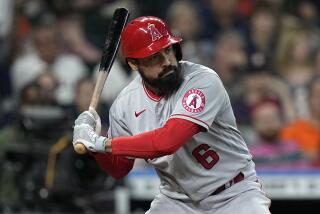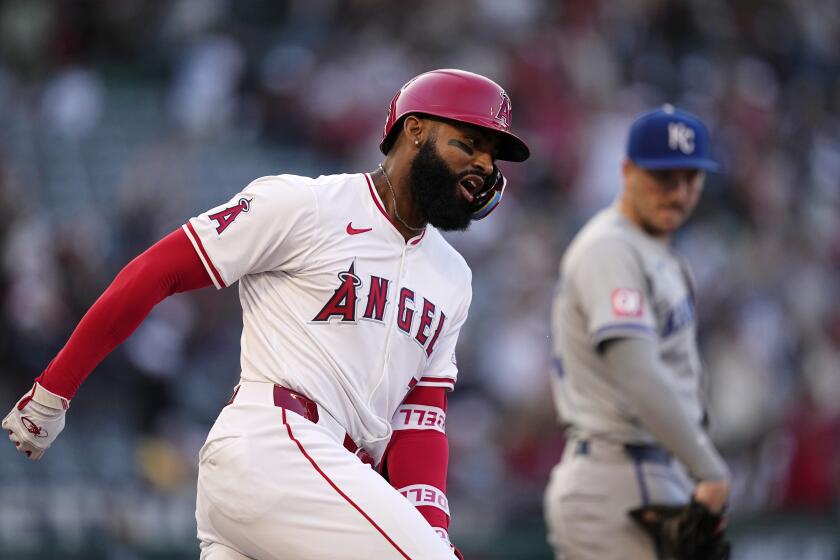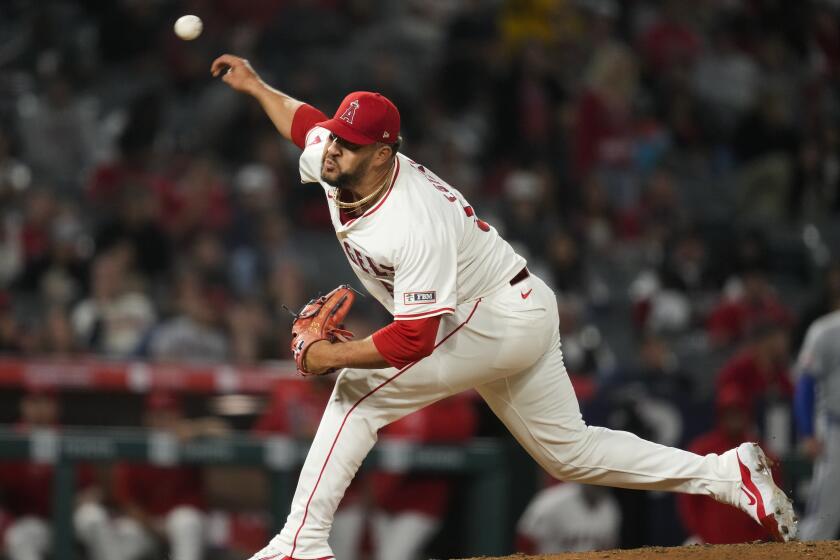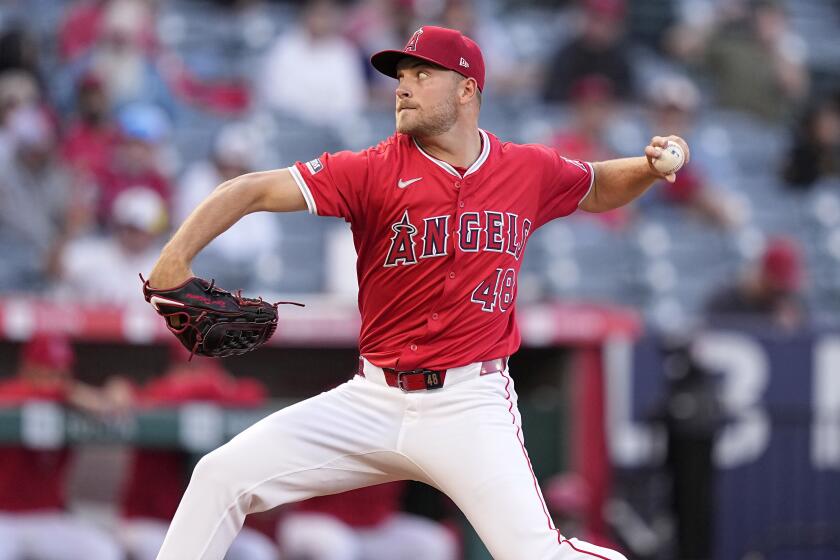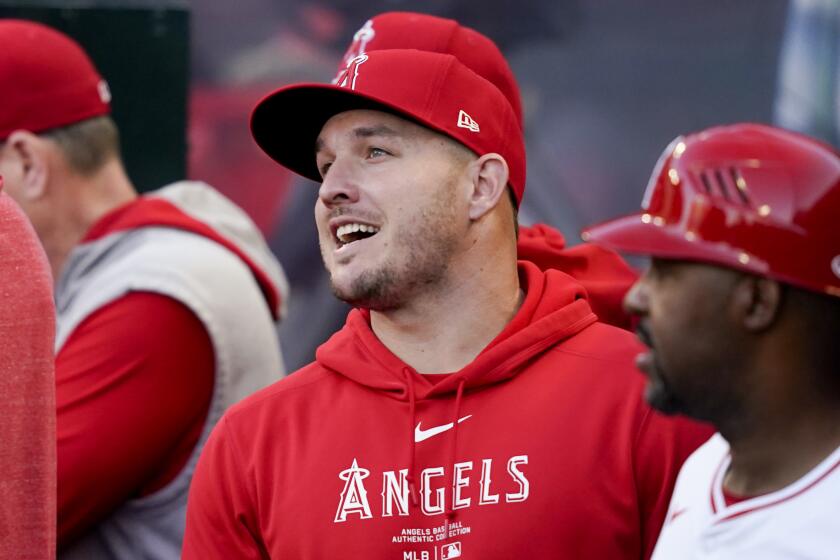Joyner Gets What He Wants : Baseball: Arbitrator rules in Angel first baseman’s favor, awarding him a $1.75-million salary.
Wally Joyner, for the first time a winner after several salary disputes with the Angels, was as relieved as he was elated Tuesday to learn that he had been awarded the $1.75-million salary he sought in arbitration. The Angels had filed at $1.225 million.
Knowing that the Kansas City Royals had prevailed over Bo Jackson in the only previous arbitration hearing this winter, Joyner had been uncertain of his fate, but it was thumbs and salary up for the 27-year-old first baseman.
For the record:
12:00 a.m. Feb. 8, 1990 For the Record
Los Angeles Times Thursday February 8, 1990 Orange County Edition Sports Part C Page 14 Column 2 Sports Desk 1 inches; 24 words Type of Material: Correction
Wally Joyner--A story in Wednesday’s editions incorrectly stated the year that Angel first baseman Wally Joyner was paid $165,000, plus a $15,000 bonus. The year was 1987.
“It’s been a little tough,” said Joyner, who now ranks among baseball’s 10 highest-paid first basemen. “I’m very grateful. Of course, I don’t know what my reaction would have been if I’d lost.”
His award, the fourth-largest ever given by an arbitrator since the process began in 1974, represents a raise of $830,000 from his 1989 base salary of $920,000. That, too, was hard won, as he settled last year just before going to arbitration.
In 1988, his contract was automatically renewed by the Angels at $340,000 after a bitter disagreement. As a rookie, he earned $165,000 plus a $15,000 bonus in 1986, the year he hit .290 with 22 home runs and 100 runs batted in.
“This is a bit of vindication for him. They’ve always made him go to the wall,” said Joyner’s agent, Barry Axelrod. “We’re thrilled for Wally. They’ve made it hard for him.”
The Angels went to arbitration Tuesday with center fielder Devon White but avoided another case when they reached an agreement with pitcher Scott Bailes, who had been scheduled for a Friday hearing.
Bailes, who was acquired from Cleveland on Jan. 9 in exchange for pitcher Colin Charland and infielder Jeff Manto, agreed to a one-year contract for $425,000 plus incentives. He had filed for arbitration at $495,000, and the Angels had filed at $375,000. He earned $300,000 last season, when he was 5-9 with a 4.28 earned-run average. White filed for arbitration at $865,000, and the Angels filed at $580,000. He earned $320,000 last season, when he hit .245 with 12 home runs and 56 RBIs.
The Angels’ last two scheduled hearings involve pitcher Kirk McCaskill on Feb. 19 and third baseman Jack Howell on Feb. 20. McCaskill filed at $1.185 million, and the Angels at $750,000; Howell filed at $780,000, and the Angels at $525,000.
Axelrod said Jackson’s case may have had little impact because “Bo was reaching a bit at the number he submitted ($1,900,001), and I don’t think the arbitrator thought Bo was typical.”
As is the custom, arbitrator Donald Sears did not explain why he found Joyner’s case more persuasive than the Angels’ arguments.
Axelrod attributed Joyner’s success in part to being measured against Montreal Expo first baseman Andres Galarraga, who hit .257 with 23 home runs and 85 RBIs last season and recently signed for $6.85 million over three years, including a 1990 salary of $1.7 million.
“He’s a very comparable player to Wally Joyner, and in practically every category and statistic career-wise, Wally outdoes him,” Axelrod said. “We were happy (Galarraga) was there to rely on.”
After his 22 home runs and 100 RBIs as a rookie, Joyner followed with 34 homers and 117 RBIs in 1987, 13 homers and 85 RBIs in 1988, and 16 homers and 79 RBIs last season. Angel representative Tal Smith emphasized those declines, but that didn’t worry Joyner.
“I never considered myself a home run hitter. I consider myself a run-producer and a team player,” he said. “I think there’s just too much emphasis on home runs. A sacrifice fly scores a run from third just as much as a solo home run scores a run. It doesn’t matter how you score them.”
Angel General Manager Mike Port said he bears no grudge toward Joyner.
“We both concluded, and it cuts both ways, that no matter what the decision, we consider him a fine player who is valued by this club, and he wants to play a large part in getting this club into postseason play,” Port said. “Wally understands he’s going to be making a good amount of money. This was procedural. It wasn’t going to change our regard for him.”
More to Read
Go beyond the scoreboard
Get the latest on L.A.'s teams in the daily Sports Report newsletter.
You may occasionally receive promotional content from the Los Angeles Times.

